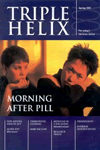In 1989, euthanasia was decriminalised in the Netherlands and in 2000 it was legalised. The headline in the British Medical Journal's news pages (BMJ 2000; 321:1433, 9 December) proclaims 'Netherlands gives more protection to doctors in euthanasia cases'. One is tempted to wonder about protection for patients.
Euthanasia has been increasingly accepted in the Netherlands since 1973, when a doctor put an end to her mother's life and received a seven day suspended sentence. It comes as no surprise, then, to anyone who has followed the story, that tolerance of the practice has brought it now to the status of law. Its progression has proved to have a momentum of its own.
Some of the milestones along that road should be noted. In 1982, a State Committee set the criteria under which euthanasia could be practised and in September 1993, Dutch Paediatricians drew up guidelines for euthanasia in children. The new law requires that 'parental consent will now be required before incurably sick minors aged 12-16 can request euthanasia'.
In December 1993 the standard questionnaire for doctors was amended to include a section related to 'Active Termination of Life without Express Request'. The non-prosecution of doctors in the Netherlands applying euthanasia under the specific regulations, led to an increase in its use, in many cases without reference to the regulations. It is estimated that the lives of some 950 to 1000 people are ended every year in the Netherlands without any request for euthanasia. In June 1994 the psychiatrist Boudewijn Chabot was found guilty of unlawful killing of a depressed patient who was not suffering from terminal illness but in his case no criminal sanction was applied.
Despite the assurances of 'doctors acting within strict criteria', some of the figures coming out of the Netherlands suggest that, in fact, anything goes. One paper refers to the 'dark numbers', unreported cases, which may be variably estimated between 30% and 70%, neither figure having any possibility of confirmation. Even the lower figure is very disturbing.
Christian ethical thinking has always given importance to the intrinsic value and equal worth of every human life, regardless of age, health, or any other extrinsic factor. Caring for the sick and disabled is a high social priority which characterises a compassionate society. This has been and remains the basis for much of our law and social policy.
It is also the basis for safe and responsible medical practice and any erosion of such a core value weakens the foundations, not only of medical practice, but of society itself. The Netherlands may see itself as leading the way in this field, but we need to ask very clearly, 'where they are going?', before we even consider following that lead.
































